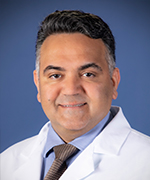Conditions We Treat
Colorectal disease can affect your health and quality of life in different ways. Whether you have difficulty controlling bowel movements or you are at risk of colorectal cancer, we can help. We use all the latest treatments, including minimally invasive surgical techniques, to help improve your quality of life or to help you in your fight for a cure.
Patients come to UC Davis because of our expertise in treating rare and common colorectal diseases. Our surgeons participate in national and international research efforts that are helping shape treatment guidelines used by hospitals across the country. We’re dedicated to advancing the diagnosis, treatment and care for even the most complicated colorectal disorders.
Colorectal Conditions We Treat
Your digestive tract is a system of organs that run from your mouth to your anus. Your colon and rectum are located toward the end, near your anus. They help you to reabsorb fluids and eliminate waste.
Many conditions can affect your colon and rectum, and we offer expert care for all of them. We will only recommend surgery if other treatments, such as changing your diet or physical therapy, do not relieve your symptoms.
Anorectal disease
UC Davis colorectal surgeons specialize in relieving the pain and discomfort many people experience from conditions affecting the anus and rectum. Learn more about anorectal disease.
- The anus is a short canal at the end of your digestive tract and is an opening that allows waste (stool) to leave the body through a bowel movement.
- The rectum is a pouch that connects your large intestine to your anus. In a healthy rectum, stool passes from the large intestine into the rectum signaling the urge to have a bowel movement.
Colorectal cancer
Colorectal cancer occurs when cancerous growths form in the lining of the colon or rectum. We work alongside nationally recognized leaders from the UC Davis Comprehensive Cancer Center to deliver expert colorectal cancer care. Surgical treatments may include removing polyps, tumors and the surrounding tissue.
Our program is one of few in the Northern California area with expertise in hereditary colorectal tumors. We offer sophisticated screening tests and access to genetic counselors that can help you understand your risk. Find out more about colorectal cancer.
Diverticulitis
Diverticula are abnormal bulging pouches that form in the lining of your digestive tract. People with diverticula often experience no symptoms until the pouches swell, bleed or become infected (diverticulitis).
Common treatments include rest, medication and a change in diet. You may need surgery if the diverticula burst open or make it difficult for stool to move through the colon. Surgical treatments include removing the damaged tissue. Read more about diverticulitis.
Inflammatory bowel disease (IBD)
Inflammatory bowel disease (IBD) happens when your immune system attacks the helpful cells and bacteria in your digestive tract. In addition to being painful, chronic swelling (inflammation) can prevent your body from absorbing nutrients from the foods you eat.
IBD includes two conditions:
- Crohn's disease affects any part of your digestive tract, from your mouth to your anus.
- Ulcerative colitis affects your colon and spares the small intestine.
If you have IBD, we will explore non-surgical treatment options first. However, you may need surgery if you experience severe infections, your intestines become damaged or medical treatment is no longer successful. Learn more about inflammatory bowel disease (IBD).
Pelvic floor dysfunction
Your pelvic floor includes different types of tissue that form a sling to hold organs such as the bladder, bowel and rectum in place. If the pelvic floor becomes weak or damaged, which can happen during childbirth or as a normal part of aging, organs in this area may slip out of place and not function properly.
Pelvic floor dysfunction includes conditions, such as rectal prolapse, that are rarely life threatening. However, pain and discomfort can affect your quality of life. Most people find symptom relief with the help of medications or exercises to strengthen pelvic floor muscles. If you do need surgery, our experts use all the latest minimally invasive treatments such as sacral nerve stimulation, which uses a pacemaker-like device to help stimulate nerves that control bowel functioning. Find out more about pelvic floor dysfunction.

